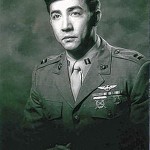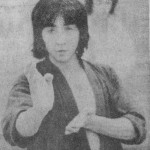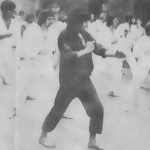http://www.thisweeknews.com/content/stories/gahanna/news/2015/07/21/houston-house-osu-to-name-residence-hall-after-glhs-alumnus.html
 John Houston
John Houston
HOUSTON HOUSE

OSU to name residence hall after GLHS alumnus
By MARLA K. KUHLMAN
Wednesday July 22, 2015 11:43 AM
John Houston, 1969 Gahanna Lincoln High School 1969 alumnus John Hideo Houston is being honored by the Ohio State University with a residence hall named in his memory.
Houston House, 97 W. Lane Ave., is one of several buildings that will open in August 2016 to honor student veterans.
Houston, a captain in the U.S. Marine Corps, died at age 34 after his helicopter crashed during training exercises in inclement weather in 1984 near Pohang, Korea.
Houston and his brother, Bill, were enrolled at Gahanna Lincoln High School and Royal Manor Elementary School, respectively, in 1966.
John Houston was born in Tokyo, Japan, in 1949 but moved to the United States in 1965, when his father, John Henry Houston, retired from government service.
After living in Washington, D.C., and Kansas City, Mo., the family had settled in San Diego when the federal government asked the elder Houston to come out of retirement and move to Columbus.
An athlete, a scholar — and cancer survivor
At Gahanna Lincoln, Houston excelled in track and field and earned varsity letters in cross county and track. He was a member of Varsity L and the high school’s literary society.
After graduating from high school, he began his studies at OSU in 1969.
During his sophomore year, he was diagnosed with stage 3 Hodgkin’s lymphoma.
Bill Houston, a 1974 Gahanna graduate, said the doctor’s prognosis was grim, noting that the survival rate was less than 20 percent for that type of cancer.
Houston said his brother wasn’t going to let the disease affect him, and the doctors at OSU began a very aggressive treatment, first removing the nodes throughout his body, followed by chemotherapy.
Houston participated in an experimental treatment, and after nearly two years of surgeries and treatment, the doctors pronounced him cancer-free.
“The Ohio State University saved his life, and he never forgot it,” said Bill Houston, who works as a program manager at Alion Science & Technology in Washington, D.C.
He said his brother’s lifelong dream was to become a Marine and to fly.
His father fueled this passion by regaling the family with his exploits as a World War I fighter pilot.
Goal met with pilot’s license, scuba training
Houston began fulfilling his goal of flying by taking private pilot’s lessons at Don Scott Field, earning his private pilot’s license and pursuing advanced licenses.
During a 1972 spring break, Houston packed his scuba gear and ended up in Key Largo, Fla., where he met Carl Gage, who ran the Carl Gage Scuba Centre.
Gage was a former Marine and aviator and took Houston on as a dive master until he returned to OSU for the fall quarter in 1972.
“Perhaps Carl’s stories about his own life and his role in the James Bond movie, Thunderball, inspired a young Buckeye to be more resolved in winning his ongoing battle with Hodgkin’s in order for him to become a Marine, fly and someday be involved in filming a movie,” Bill Houston said.
In the summer of 1973, John Houston began a year studying abroad. He started this journey in Japan as part of an OSU exchange program with the Keio University. After his semester at Keio, he remained in Japan, retracing his roots and continuing his karate training. He then hitchhiked through Asia and Europe to complete an around-the-world journey.
Houston graduated from OSU in 1975 with a bachelor’s degree in business administration.
Because he was ill during a large part of his time at Ohio State, he wasn’t able to complete both sessions of a platoon leaders class, a commissioning program offered by the Marines, so he started his second session after graduation.
He completed the training with honors and received his commission as a second lieutenant in the Marine Corps.
He then transferred to Pensacola, Fla., to begin flight training, and he was designated a Naval Aviator in May 1979.
Two years later, Houston earned a Humanitarian Medal by assisting the government of Sri Lanka in delivering television transmitters to a remote site. He helped provide the people of Sri Lanka full national coverage of their television station for the first time, delivering more than 15 tons of equipment to Mount Pidurutalagala.
Soaring into the world of war movies
In 1982, Houston served as a liaison officer working with the Japanese Air Self Defense Forces.
Upon completion of that mission, the producers of the movie, The Killing Fields, approached the Marine Corps about assisting in filming the evacuation of the American Embassy in Saigon. Because CH-53 helicopters were involved, the Marine Corps in 1983 sent Houston and his crew to fly the evacuation scenes.
After completing the scenes, his squadron, HMH 361, the Flying Tigers out of MCAS Santa Ana, was to take part in a historic flight of the first CH-53 squadron to be fully night-vision qualified.
Poor conditions cause deadly helicopter crash
On the morning of March 24, 1984, two flights of four CH-53 helicopters began their mission from Pohang, Korea, about 170 miles southeast of Seoul, Korea. The first flight crew completed the mission, but the second flight aborted its mission because of deteriorating conditions.
On the return to base, Houston’s helicopter struck the mountainside 29 miles northwest of Pohang. and all on board were killed instantly — 18 U.S. Marines and 11 Republic of Korea Marines.
Today, a memorial in Pohang commemorates those who died.
Although he was born in Japan, Bill Houston said, his brother dearly loved America.
“Patriotism was not some cliche, and the lessons he learned at the Ohio State University stayed with him until the end,” he said.
Houston told ThisWeek his brother would be honored by the recognition from OSU.
“He would say he isn’t deserving of such an honor,” he said.
In addition to the building in the North Residential District being named in honor of Houston, photos and other memorabilia from his time as a student at OSU will be displayed in the hall.
“He often spoke of Ohio State and the chances given him because of his time there,” Houston said. “He lived what Woody Hayes preached quite often: ‘You can never pay back, but you can always pay it forward.’ John always paid it forward.”

